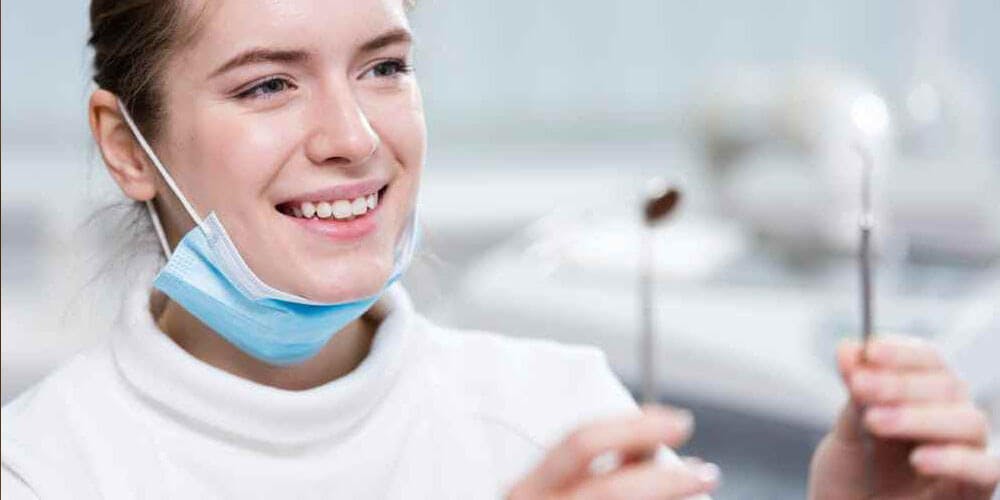Posted by Dr. Taner Cakmak on Tue, 7 May 2024
Kanata South Dental - Dentist Kanata

Airflow dental cleaning, also known as air polishing or dental air polishing, is a modern technique used by dental professionals to clean teeth thoroughly. It involves the use of a specialized device that combines a stream of compressed air, water, and fine powder particles to remove stains, plaque, and tartar from the tooth surfaces.
Here's how airflow dental cleaning typically works:
- Preparation: Before starting the procedure, the dental hygienist or dentist will examine your teeth and gums to assess the level of cleaning required. They may also take X-rays if needed.
- Scaling: If there is significant tartar buildup (calculus) on your teeth, the dental professional may perform scaling first. Scaling involves using specialized tools to remove tartar from above and below the gum line.
- Airflow Cleaning: Once scaling is done (if necessary), the airflow cleaning procedure begins. The dental professional uses a handheld device that delivers a controlled stream of compressed air, water, and a specially formulated powder (usually sodium bicarbonate or glycine-based) onto the tooth surfaces.
- Cleaning and Polishing: The high-pressure stream of air, water, and powder effectively removes surface stains, plaque, and soft deposits from the teeth. It also polishes the enamel, leaving the teeth feeling smooth and looking brighter.
- Rinsing: After airflow cleaning, your mouth will be rinsed to remove any remaining particles and debris.
Benefits of airflow dental cleaning include:
- Effective Cleaning
- Gentle on Teeth
- Quick Procedure
- Improved Aesthetics
- Promotes Oral Health
It's important to note that while airflow cleaning is effective for routine dental hygiene, it may not be suitable for all patients, especially those with certain dental conditions or sensitivities. Your dental professional will assess your oral health and recommend the most appropriate cleaning method for you.
HOW OFTEN SHOULD YOU GET YOUR TEETH CLEANED WITH AIR FLOW?
The frequency of getting your teeth cleaned with airflow or any other dental cleaning method depends on several factors, including your oral health status, risk factors for dental problems, and your dentist's recommendations. Here are some general guidelines:
- Regular Check-ups
- Individual Needs
- Risk Factors
- Personalized Recommendation
- Home Care
It's important to follow your dentist's recommendations for dental cleanings and check-ups to promote optimal oral health and address any dental issues promptly. If you have specific concerns about the frequency of dental cleanings or other aspects of your oral care, discuss them with your dental professional for personalized guidance.
DOES AIRFLOW REMOVE TARTAR?
Airflow cleaning is effective at removing soft deposits, stains, and plaque from the tooth surfaces but may have limitations when it comes to removing hardened tartar, also known as calculus. Here's a breakdown of what airflow cleaning can and cannot remove:
- Soft Deposits and Stains
- Plaque
- Tartar (Calculus)
In summary, while airflow cleaning is excellent for removing soft deposits, stains, and plaque, it is not a substitute for professional scaling and tartar removal. For individuals with significant tartar buildup, a combination of scaling (to remove tartar) and airflow cleaning (to remove soft deposits and stains) may be recommended for comprehensive dental cleaning and maintenance of oral health. Your dental professional can assess your oral health needs and recommend the most appropriate cleaning techniques for you.
WHAT ARE THE THREE TYPES OF AIRFLOW SYSTEM?
There are three main types of airflow systems used in dentistry:
- Sodium Bicarbonate-Based Systems
- Glycine-Based Systems
- Combination Systems
Each type of airflow system has its advantages and may be selected based on factors such as patient sensitivity, the extent of cleaning required, and the preferences of the dental professional. Your dentist or dental hygienist can determine the most suitable airflow system for your dental cleaning based on your oral health status and individual needs.
WHAT ARE THE CONTRAINDICATIONS FOR AIRFLOW?
There are several contraindications or situations where airflow cleaning may not be suitable or should be used with caution:
- Severe Gum Disease (Periodontitis)
- Respiratory Issues
- Hypersensitivity or Allergy
- Exposed Dentin or Tooth Sensitivity
- Recent Oral Surgery or Dental Restorations
- Pregnancy
- Children
It's crucial for dental professionals to conduct a thorough assessment of each patient's oral health, medical history, and individual risk factors before recommending airflow cleaning or any dental procedure. Patients should communicate any existing medical conditions, allergies, or sensitivities to their dental provider to ensure safe and appropriate dental care.
DO YOU NEED AIRFLOW DENTAL CLEANING?
If you are looking for Airflow dental cleaning in Kanata. You can reach out to Kanata South Dental at 613-519-1400. Dr. Taner Cakmak and his professional team would be happy to help you.
Dentist Kanata
We will gladly answer any questions you may have.
Ask QuestionsKanata South Dental offers the ability to request your dentist appointments online. Schedule an appointment now!
Book OnlineBy filling out the New Patient Forms ahead of time you will save significant time on your visit.
New Patient FormsLatest News
Key Benefits of Dental Cleaning
Fri, 9 Jan 2026Key Benefits of Dental Cleaning (And What Happens If You Skip Them) Regular dental cleanings play an important role in keeping yo...
Continue Reading